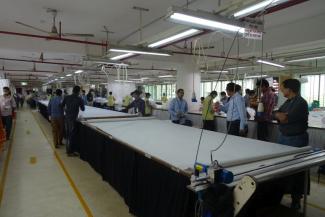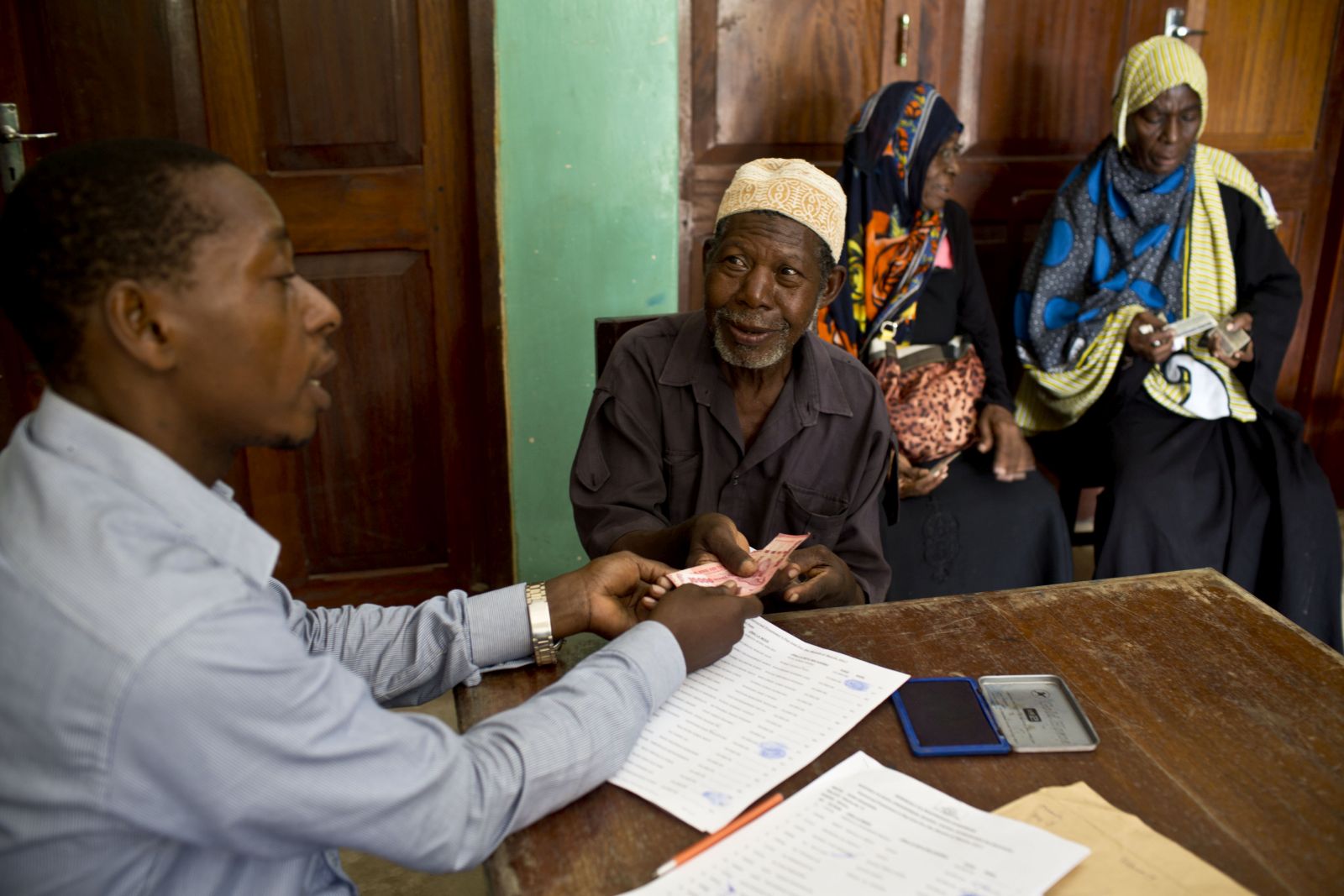Labour relations
One law for all

The Rana Plaza factory building was so dilapidated that it collapsed, burying masses of workers in its rubble. More than 1,100 people died in the incident, and at least twice as many were injured.
A large share of the factory’s output consisted of garments produced on behalf of European and American brands. The accident triggered a long overdue debate at the international level concerning inhuman working conditions, exploitation and responsibilities along global supply chains.
Within months of the catastrophe, international brand companies got together with both global and local trade unions. They concluded the Accord on Fire and Building Safety in Bangladesh. It was, and still is, the response to the Rana Plaza collapse with the most far-reaching consequences. The Accord calls for various safety precautions at production facilities, including independent inspections and public disclosure of findings.
Since 2013, more than 200 international brands from over 20 countries have signed up to the legally binding Accord. Next year, after running for five years, it was supposed to expire. In spite of much progress made, the sad truth is that many of the more than 1,600 factories inspected by Accord contractors are still behind schedule. For example, safety and health committees have not been established as planned in many places. The greatest problem, however, is the lack of strong social structures at the local level that might permit the project to be transferred from the international level to Bangladesh.
Western interference?
The recent announcement that the Accord would be extended beyond 2018 for another three years did not come as a surprise. The independent safety inspection programme will continue to ensure that progress achieved under the first agreement is maintained. In comparison with the first agreement, the new one provides notable improvements for workers, including:
- a requirement for factories to pay severance when they close or relocate due to safety issues and
- protections for union members who are retaliated against by their employer when they speak up for their safety individually or collectively.
In comparison with the previous agreement, the new Accord’s scope may extend beyond garments factories to signatory companies’ suppliers of home textiles, yarn, cloth and other products. Different parties have reacted differently to the two-year extension. Some hail this step as a proof of successful transnational cooperation; others see it as unwelcome interference by the west. Employers and factory owners, in particular, have expressed opposition to the extension. When they failed to be accepted as only partial members of the extended Accord, they declared they would launch a similar initiative called “Shonman” (Respect). However, nothing has been heard of it since.
Representatives of employers and the Bangladeshi government have long complained that external actors are meddling in Bangladesh’s affairs and institutions. In particular, they find the EU irritating because it is signalling that it will review trade preferences in the “Everything but Arms (EBA)” context unless labour-rights are fully guaranteed.
Bangladesh is a young and rising country. It became a low middle-income country in 2015. The authorities fear for the economy. Garments production is the most important industry by far, generating annual exports worth more than $ 28 billion. The sights are set on doubling the figure by 2021. More than 60 % of all textile exports currently go to the European Union. The EBA agreement with the EU, which largely eliminates import duties and quantitative restrictions, has contributed crucially to Bangladesh’s economic development. Losing it could have dire consequences.
Violations of labour rights
But even though Bangladesh is in the international spotlight, labour-rights violations have not stopped. Recent protests in the manufacturing hub of Ashulia in the Dhaka agglomeration were an example. Late last year, large numbers of textile workers took to the streets. They demanded an increase in the monthly minimum wage, which has been 5,800 taka (around € 60) since 2013. Soon after, some 1,500 workers were sacked and 35 trade-union activists were arrested. Many of the dismissed are still waiting to be reinstated.
The International Labour Organization’s Conference Committee on the Application of Standards has repeatedly noted breaches of labour rights in Bangladesh, especially in regard to the freedom of association. Red tape, a threshold of 30 %, makes it hard to establish trade unions.
The government must tackle these issues fast and draft the kind of reform programme the EU demands. Should it fail to do so, the EU may officially begin an investigation process that may lead to the temporary suspension of preferential trade rules. Bangladesh’s success will depend among others on whether the reform expands labour rights so more workers will enjoy them in the future.
Bangladesh is a country of around 160 million people, and nearly half of them are younger than 25 years. The economically active population numbers around 60 million. Some 4.4 million people are employed in the garments industry, but less than five percent of them are unionised. In many other industries, the share is even lower. Around 80 % are employed in the fast-growing informal sector and 20 % in the formal sector.
The vast majority of informal-sector workers are women. In general, workers in the informal sector are not protected by labour law, and even people in formal employment do not necessarily benefit from statutory employment rights. Some do not fall within the category of “labour”. Moreover, totally different laws apply in export processing zones (EPZs), where unionisation is legally impossible.
Trade unions therefore keep raising the demand: “One law for all workers”. Such a law would apply in all industries and all over the country. This is an important topic, given that another 100 Special Economic Zones are being planned. However, union activists’ expectations are not high. No major breakthrough is anticipated, in spite of external pressure.
Need for a re-think
At tripartite committee has been established to support the reform process. It includes representatives of employers, labour and the government. However, a society-wide re-think is needed for the committee to serve its purpose effectively. To date, trade unions are generally not considered serious partners that can contribute to solving society’s problems in cooperative efforts that would both drive economic development and promote social justice.
To enable the trade unions to play their full role in society, Bangladesh needs to guarantee full compliance with the ILO’s core labour standards , which the country has ratified. On the other hand, the unions themselves must strive for greater sustainability. They are paralysed by fragmentation, politicisation and infighting. Ensuring sustainability would imply promoting their own young talent and, in particular, involving women. Men tend to lead the trade unions even though many sectors are marked by female staff. In the garments industry, for example, their share is well over 60 %.
For Bangladesh to stay its successful course, much more needs to happen. The extension of the Accord is an important milestone. It shows a commitment by international companies to keep relying on Bangladesh as a manufacturing site and to support the country’s implementation of health and safety standards. This should boost confidence on all sides. Bangladesh’s greatest worry is that international companies will move on to other countries with even cheaper and faster manufacturing facilities.
Beyond Bangladesh’s borders, international partners must keep up their efforts. Sustained progress will depend on international companies and brands contributing to the improvement of labour rights along their supply chains. The ongoing debate about responsibilities along the global supply chains of multinational companies matters very much, and human-rights related due diligence initiatives mark an important step forward.
The idea is to commit major companies to identifying risks to human rights and the environment along their supply chains. They must then take preventive action and pay compensations when something goes wrong. France has passed a law to ensure these things. Other countries must follow its example. Voluntary action will not suffice, so sustained success will depend on legally defined due diligence in regard to human rights.
Franziska Korn has been heading the Friedrich-Ebert-Stiftung (FES) office in Bangladesh since 2016. In 2017, the FES inaugurated the first “Academy of Work” in cooperation with BRAC University and BILS, a trade-union think tank. The Academy is a unique cross-sectoral trainee programme for mid-level trade unionists in Bangladesh.
franziska.korn@fesbd.org
http://www.fes-bangladesh.org/













